Analyzing Intercultural Competence in International Business
VerifiedAdded on 2022/12/30
|6
|1256
|48
Essay
AI Summary
This essay delves into the critical importance of intercultural competence within the realm of international business. It establishes intercultural competence as a crucial skill for businesses operating in a globalized world, emphasizing the need for understanding diverse cultures, values, and communication styles. The essay argues that intercultural competence facilitates smooth business operations, fosters effective communication, and enables companies to capitalize on international expansion opportunities. It highlights the impact of cultural understanding on employee interaction, risk mitigation, and the development of a competitive advantage. Furthermore, the essay discusses the challenges multinational companies face and recommends training programs to overcome linguistic and cultural barriers, ultimately contributing to the success and sustainability of businesses in the international arena. The essay concludes by reiterating the significance of intercultural competence for maintaining a positive brand image and fostering strong relationships between employees and managers, with recommendations for improving cultural understanding through training.
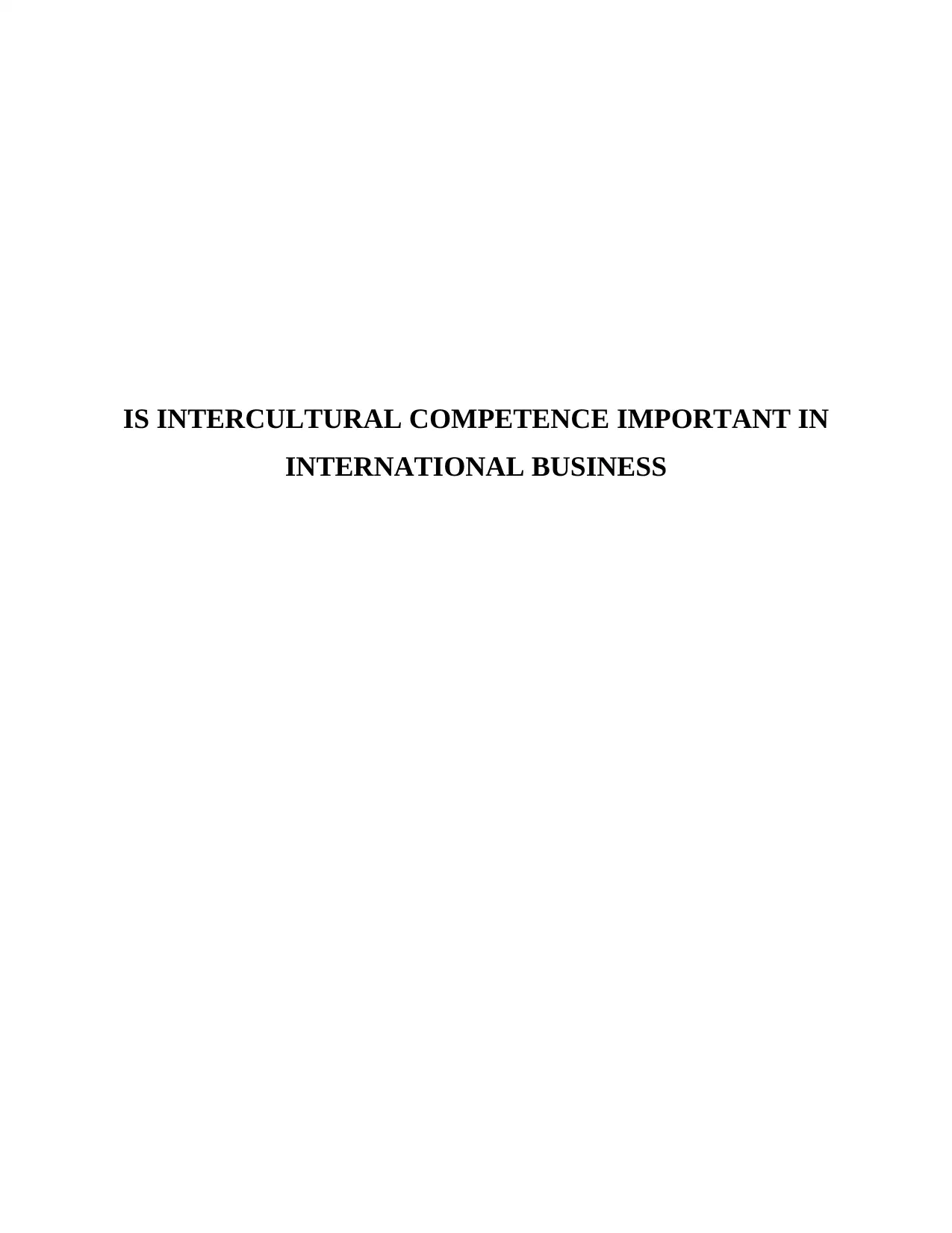
IS INTERCULTURAL COMPETENCE IMPORTANT IN
INTERNATIONAL BUSINESS
INTERNATIONAL BUSINESS
Paraphrase This Document
Need a fresh take? Get an instant paraphrase of this document with our AI Paraphraser
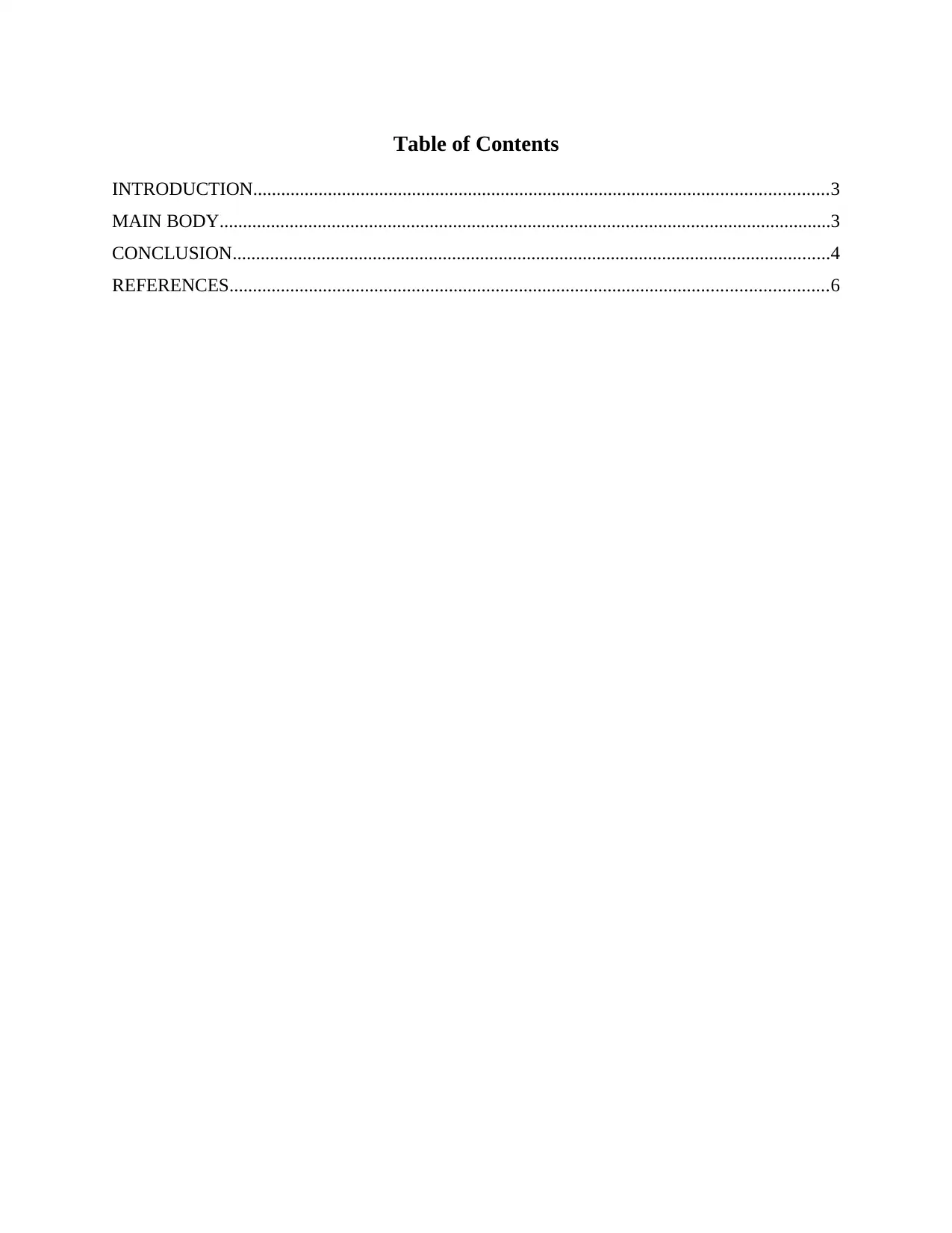
Table of Contents
INTRODUCTION...........................................................................................................................3
MAIN BODY...................................................................................................................................3
CONCLUSION................................................................................................................................4
REFERENCES................................................................................................................................6
INTRODUCTION...........................................................................................................................3
MAIN BODY...................................................................................................................................3
CONCLUSION................................................................................................................................4
REFERENCES................................................................................................................................6
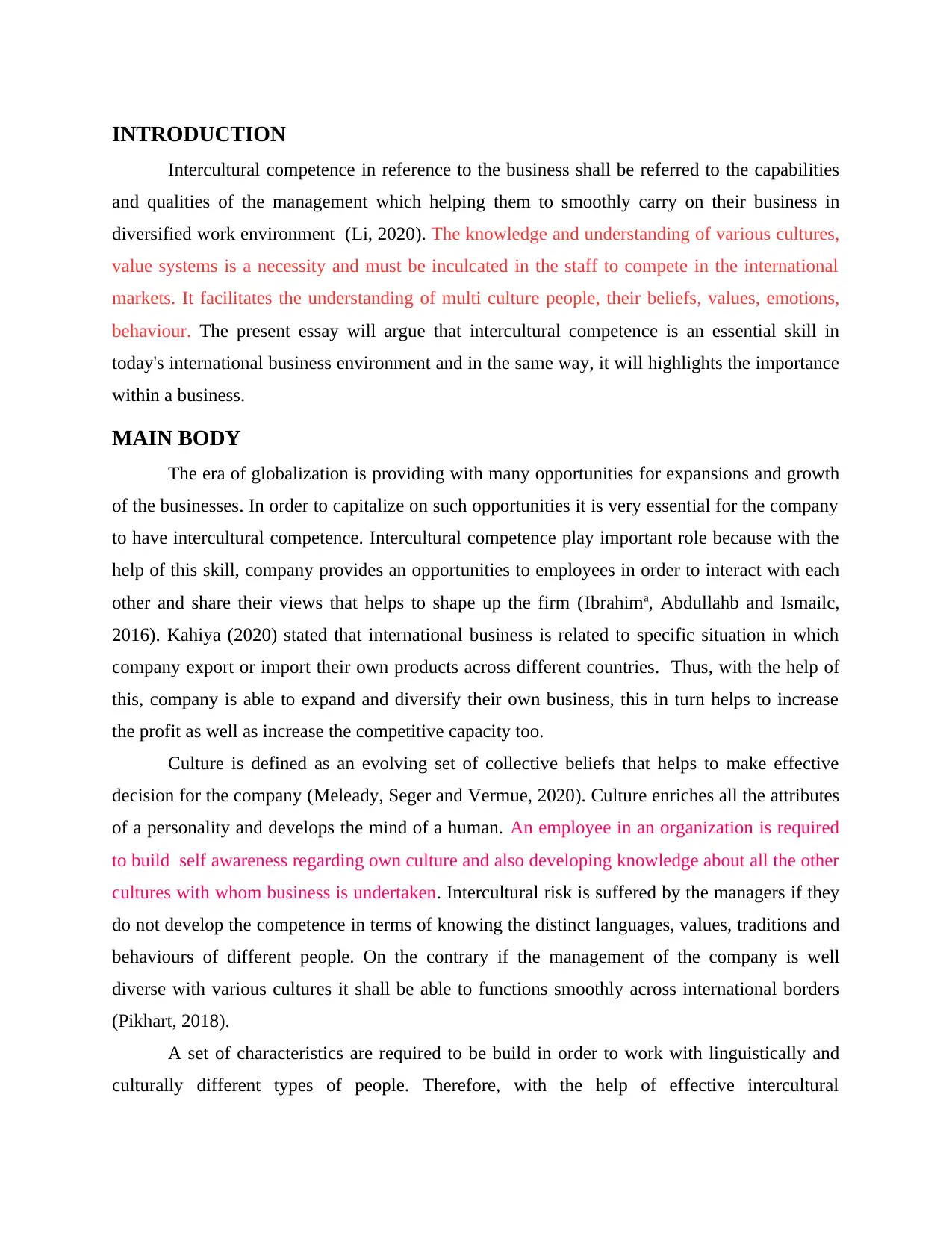
INTRODUCTION
Intercultural competence in reference to the business shall be referred to the capabilities
and qualities of the management which helping them to smoothly carry on their business in
diversified work environment (Li, 2020). The knowledge and understanding of various cultures,
value systems is a necessity and must be inculcated in the staff to compete in the international
markets. It facilitates the understanding of multi culture people, their beliefs, values, emotions,
behaviour. The present essay will argue that intercultural competence is an essential skill in
today's international business environment and in the same way, it will highlights the importance
within a business.
MAIN BODY
The era of globalization is providing with many opportunities for expansions and growth
of the businesses. In order to capitalize on such opportunities it is very essential for the company
to have intercultural competence. Intercultural competence play important role because with the
help of this skill, company provides an opportunities to employees in order to interact with each
other and share their views that helps to shape up the firm (Ibrahimª, Abdullahb and Ismailc,
2016). Kahiya (2020) stated that international business is related to specific situation in which
company export or import their own products across different countries. Thus, with the help of
this, company is able to expand and diversify their own business, this in turn helps to increase
the profit as well as increase the competitive capacity too.
Culture is defined as an evolving set of collective beliefs that helps to make effective
decision for the company (Meleady, Seger and Vermue, 2020). Culture enriches all the attributes
of a personality and develops the mind of a human. An employee in an organization is required
to build self awareness regarding own culture and also developing knowledge about all the other
cultures with whom business is undertaken. Intercultural risk is suffered by the managers if they
do not develop the competence in terms of knowing the distinct languages, values, traditions and
behaviours of different people. On the contrary if the management of the company is well
diverse with various cultures it shall be able to functions smoothly across international borders
(Pikhart, 2018).
A set of characteristics are required to be build in order to work with linguistically and
culturally different types of people. Therefore, with the help of effective intercultural
Intercultural competence in reference to the business shall be referred to the capabilities
and qualities of the management which helping them to smoothly carry on their business in
diversified work environment (Li, 2020). The knowledge and understanding of various cultures,
value systems is a necessity and must be inculcated in the staff to compete in the international
markets. It facilitates the understanding of multi culture people, their beliefs, values, emotions,
behaviour. The present essay will argue that intercultural competence is an essential skill in
today's international business environment and in the same way, it will highlights the importance
within a business.
MAIN BODY
The era of globalization is providing with many opportunities for expansions and growth
of the businesses. In order to capitalize on such opportunities it is very essential for the company
to have intercultural competence. Intercultural competence play important role because with the
help of this skill, company provides an opportunities to employees in order to interact with each
other and share their views that helps to shape up the firm (Ibrahimª, Abdullahb and Ismailc,
2016). Kahiya (2020) stated that international business is related to specific situation in which
company export or import their own products across different countries. Thus, with the help of
this, company is able to expand and diversify their own business, this in turn helps to increase
the profit as well as increase the competitive capacity too.
Culture is defined as an evolving set of collective beliefs that helps to make effective
decision for the company (Meleady, Seger and Vermue, 2020). Culture enriches all the attributes
of a personality and develops the mind of a human. An employee in an organization is required
to build self awareness regarding own culture and also developing knowledge about all the other
cultures with whom business is undertaken. Intercultural risk is suffered by the managers if they
do not develop the competence in terms of knowing the distinct languages, values, traditions and
behaviours of different people. On the contrary if the management of the company is well
diverse with various cultures it shall be able to functions smoothly across international borders
(Pikhart, 2018).
A set of characteristics are required to be build in order to work with linguistically and
culturally different types of people. Therefore, with the help of effective intercultural
⊘ This is a preview!⊘
Do you want full access?
Subscribe today to unlock all pages.

Trusted by 1+ million students worldwide
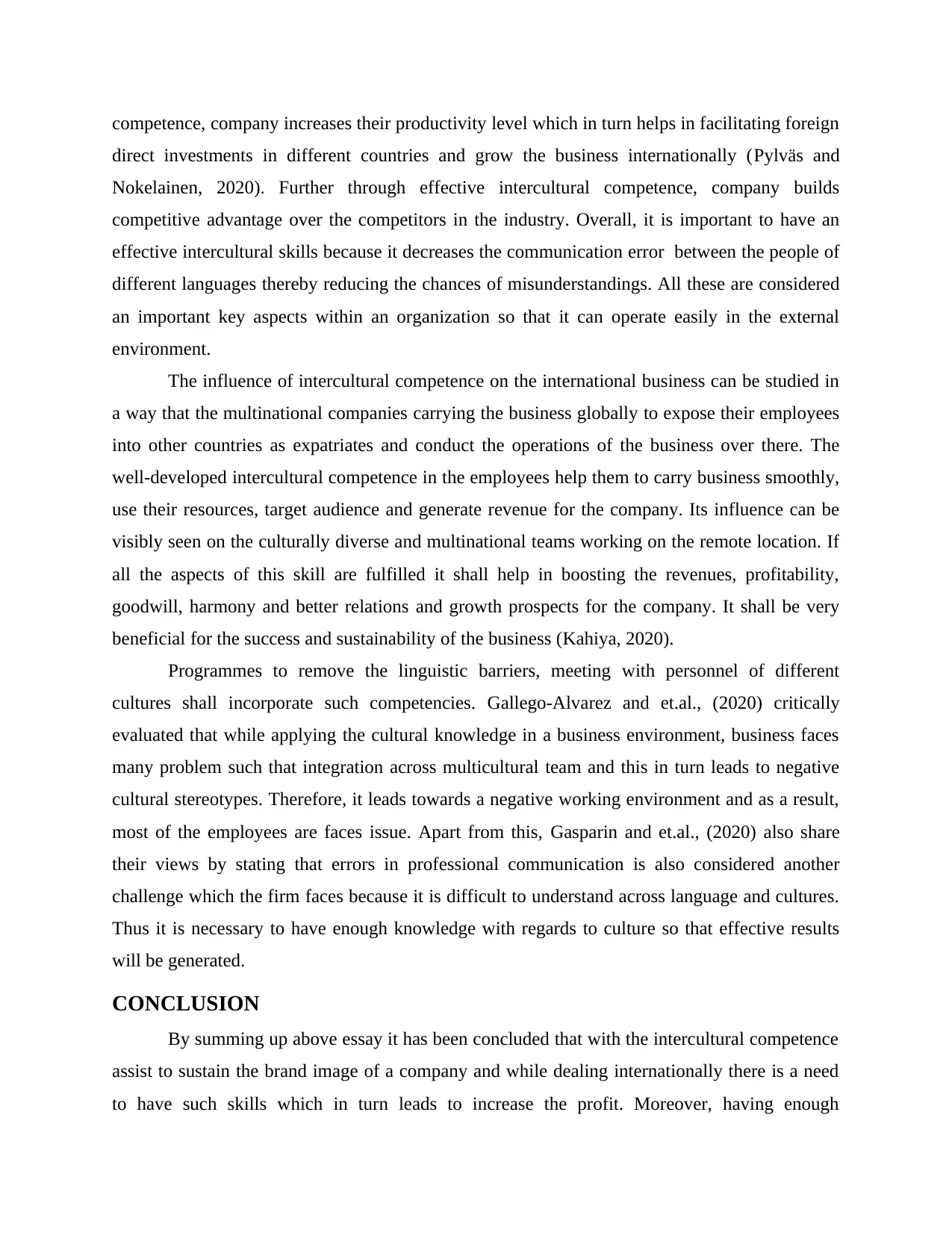
competence, company increases their productivity level which in turn helps in facilitating foreign
direct investments in different countries and grow the business internationally (Pylväs and
Nokelainen, 2020). Further through effective intercultural competence, company builds
competitive advantage over the competitors in the industry. Overall, it is important to have an
effective intercultural skills because it decreases the communication error between the people of
different languages thereby reducing the chances of misunderstandings. All these are considered
an important key aspects within an organization so that it can operate easily in the external
environment.
The influence of intercultural competence on the international business can be studied in
a way that the multinational companies carrying the business globally to expose their employees
into other countries as expatriates and conduct the operations of the business over there. The
well-developed intercultural competence in the employees help them to carry business smoothly,
use their resources, target audience and generate revenue for the company. Its influence can be
visibly seen on the culturally diverse and multinational teams working on the remote location. If
all the aspects of this skill are fulfilled it shall help in boosting the revenues, profitability,
goodwill, harmony and better relations and growth prospects for the company. It shall be very
beneficial for the success and sustainability of the business (Kahiya, 2020).
Programmes to remove the linguistic barriers, meeting with personnel of different
cultures shall incorporate such competencies. Gallego‐Alvarez and et.al., (2020) critically
evaluated that while applying the cultural knowledge in a business environment, business faces
many problem such that integration across multicultural team and this in turn leads to negative
cultural stereotypes. Therefore, it leads towards a negative working environment and as a result,
most of the employees are faces issue. Apart from this, Gasparin and et.al., (2020) also share
their views by stating that errors in professional communication is also considered another
challenge which the firm faces because it is difficult to understand across language and cultures.
Thus it is necessary to have enough knowledge with regards to culture so that effective results
will be generated.
CONCLUSION
By summing up above essay it has been concluded that with the intercultural competence
assist to sustain the brand image of a company and while dealing internationally there is a need
to have such skills which in turn leads to increase the profit. Moreover, having enough
direct investments in different countries and grow the business internationally (Pylväs and
Nokelainen, 2020). Further through effective intercultural competence, company builds
competitive advantage over the competitors in the industry. Overall, it is important to have an
effective intercultural skills because it decreases the communication error between the people of
different languages thereby reducing the chances of misunderstandings. All these are considered
an important key aspects within an organization so that it can operate easily in the external
environment.
The influence of intercultural competence on the international business can be studied in
a way that the multinational companies carrying the business globally to expose their employees
into other countries as expatriates and conduct the operations of the business over there. The
well-developed intercultural competence in the employees help them to carry business smoothly,
use their resources, target audience and generate revenue for the company. Its influence can be
visibly seen on the culturally diverse and multinational teams working on the remote location. If
all the aspects of this skill are fulfilled it shall help in boosting the revenues, profitability,
goodwill, harmony and better relations and growth prospects for the company. It shall be very
beneficial for the success and sustainability of the business (Kahiya, 2020).
Programmes to remove the linguistic barriers, meeting with personnel of different
cultures shall incorporate such competencies. Gallego‐Alvarez and et.al., (2020) critically
evaluated that while applying the cultural knowledge in a business environment, business faces
many problem such that integration across multicultural team and this in turn leads to negative
cultural stereotypes. Therefore, it leads towards a negative working environment and as a result,
most of the employees are faces issue. Apart from this, Gasparin and et.al., (2020) also share
their views by stating that errors in professional communication is also considered another
challenge which the firm faces because it is difficult to understand across language and cultures.
Thus it is necessary to have enough knowledge with regards to culture so that effective results
will be generated.
CONCLUSION
By summing up above essay it has been concluded that with the intercultural competence
assist to sustain the brand image of a company and while dealing internationally there is a need
to have such skills which in turn leads to increase the profit. Moreover, having enough
Paraphrase This Document
Need a fresh take? Get an instant paraphrase of this document with our AI Paraphraser

knowledge of culture also assist to develop strong relationship between employees and
managers. It is further recommended to the firm that in order to improve the cultural issues
among business , effective training session can be implemented that helps to understand different
languages so that miscommunication can be improved.
managers. It is further recommended to the firm that in order to improve the cultural issues
among business , effective training session can be implemented that helps to understand different
languages so that miscommunication can be improved.
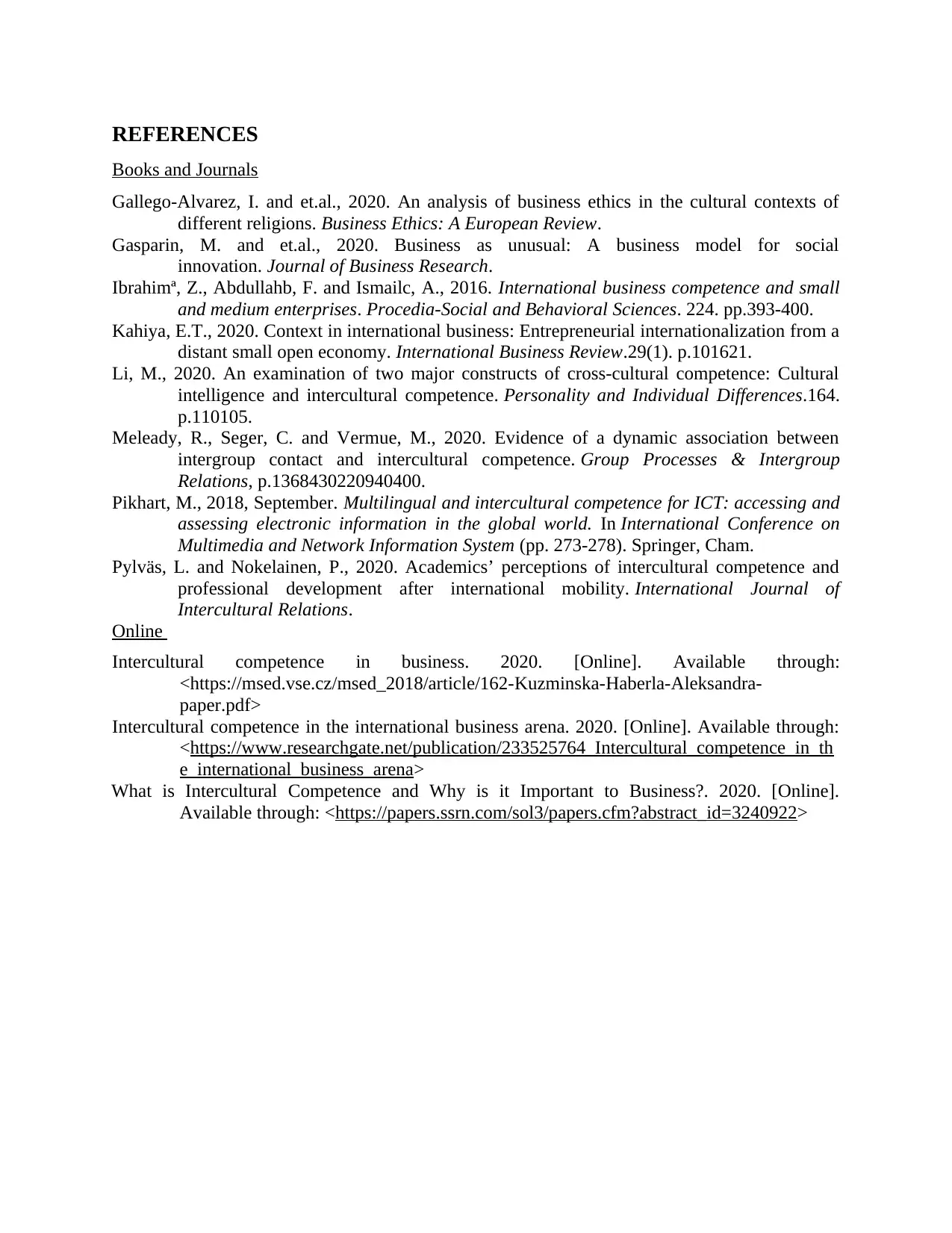
REFERENCES
Books and Journals
Gallego‐Alvarez, I. and et.al., 2020. An analysis of business ethics in the cultural contexts of
different religions. Business Ethics: A European Review.
Gasparin, M. and et.al., 2020. Business as unusual: A business model for social
innovation. Journal of Business Research.
Ibrahimª, Z., Abdullahb, F. and Ismailc, A., 2016. International business competence and small
and medium enterprises. Procedia-Social and Behavioral Sciences. 224. pp.393-400.
Kahiya, E.T., 2020. Context in international business: Entrepreneurial internationalization from a
distant small open economy. International Business Review.29(1). p.101621.
Li, M., 2020. An examination of two major constructs of cross-cultural competence: Cultural
intelligence and intercultural competence. Personality and Individual Differences.164.
p.110105.
Meleady, R., Seger, C. and Vermue, M., 2020. Evidence of a dynamic association between
intergroup contact and intercultural competence. Group Processes & Intergroup
Relations, p.1368430220940400.
Pikhart, M., 2018, September. Multilingual and intercultural competence for ICT: accessing and
assessing electronic information in the global world. In International Conference on
Multimedia and Network Information System (pp. 273-278). Springer, Cham.
Pylväs, L. and Nokelainen, P., 2020. Academics’ perceptions of intercultural competence and
professional development after international mobility. International Journal of
Intercultural Relations.
Online
Intercultural competence in business. 2020. [Online]. Available through:
<https://msed.vse.cz/msed_2018/article/162-Kuzminska-Haberla-Aleksandra-
paper.pdf>
Intercultural competence in the international business arena. 2020. [Online]. Available through:
<https://www.researchgate.net/publication/233525764_Intercultural_competence_in_th
e_international_business_arena>
What is Intercultural Competence and Why is it Important to Business?. 2020. [Online].
Available through: <https://papers.ssrn.com/sol3/papers.cfm?abstract_id=3240922>
Books and Journals
Gallego‐Alvarez, I. and et.al., 2020. An analysis of business ethics in the cultural contexts of
different religions. Business Ethics: A European Review.
Gasparin, M. and et.al., 2020. Business as unusual: A business model for social
innovation. Journal of Business Research.
Ibrahimª, Z., Abdullahb, F. and Ismailc, A., 2016. International business competence and small
and medium enterprises. Procedia-Social and Behavioral Sciences. 224. pp.393-400.
Kahiya, E.T., 2020. Context in international business: Entrepreneurial internationalization from a
distant small open economy. International Business Review.29(1). p.101621.
Li, M., 2020. An examination of two major constructs of cross-cultural competence: Cultural
intelligence and intercultural competence. Personality and Individual Differences.164.
p.110105.
Meleady, R., Seger, C. and Vermue, M., 2020. Evidence of a dynamic association between
intergroup contact and intercultural competence. Group Processes & Intergroup
Relations, p.1368430220940400.
Pikhart, M., 2018, September. Multilingual and intercultural competence for ICT: accessing and
assessing electronic information in the global world. In International Conference on
Multimedia and Network Information System (pp. 273-278). Springer, Cham.
Pylväs, L. and Nokelainen, P., 2020. Academics’ perceptions of intercultural competence and
professional development after international mobility. International Journal of
Intercultural Relations.
Online
Intercultural competence in business. 2020. [Online]. Available through:
<https://msed.vse.cz/msed_2018/article/162-Kuzminska-Haberla-Aleksandra-
paper.pdf>
Intercultural competence in the international business arena. 2020. [Online]. Available through:
<https://www.researchgate.net/publication/233525764_Intercultural_competence_in_th
e_international_business_arena>
What is Intercultural Competence and Why is it Important to Business?. 2020. [Online].
Available through: <https://papers.ssrn.com/sol3/papers.cfm?abstract_id=3240922>
⊘ This is a preview!⊘
Do you want full access?
Subscribe today to unlock all pages.

Trusted by 1+ million students worldwide
1 out of 6
Related Documents
Your All-in-One AI-Powered Toolkit for Academic Success.
+13062052269
info@desklib.com
Available 24*7 on WhatsApp / Email
![[object Object]](/_next/static/media/star-bottom.7253800d.svg)
Unlock your academic potential
Copyright © 2020–2026 A2Z Services. All Rights Reserved. Developed and managed by ZUCOL.




